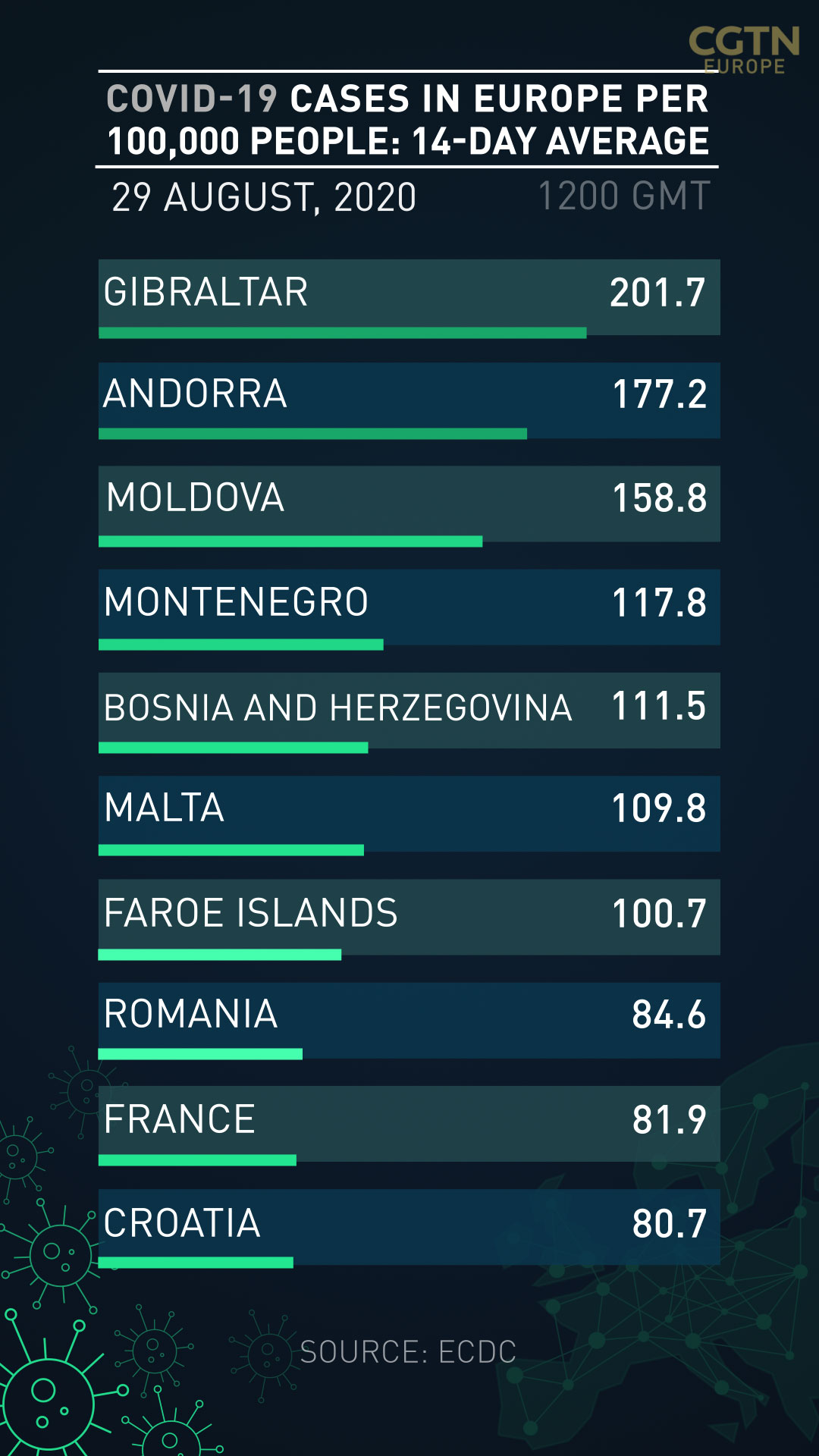
People take part in a demonstration to protest against restrictions related to the coronavirus pandemic in Berlin. /JohnMacDougall/AFP
People take part in a demonstration to protest against restrictions related to the coronavirus pandemic in Berlin. /JohnMacDougall/AFP
TOP HEADLINES
- Police in Berlin have ordered people demonstrating against Germany's coronavirus restrictions to disperse. Authorities say an estimated 18,000 participants were flouting rules about social distancing and other measures. Protestors won the final stage of a legal battle last night for it to go ahead and 3,000 police are being deployed.
- The French health ministry says cases are rising "exponentially." President Macron has warned that another lockdown may be coming as a further 7,379 cases were confirmed on Friday, which is the country's largest rise in cases since mid-May.
- England could face "national action" and "very extensive local lockdowns" in the event of a winter coronavirus wave, said the government on Saturday, with a "worst-case scenario" of 80,000 deaths. "A second wave is clearly visible in other parts of the world," Health Secretary Matt Hancock told Saturday's Times newspaper. "Cases go up again, and we have to use very extensive local lockdowns or take further national action. We don't rule that out but we don't want to see it."
- The Tour de France cycling tournament starts today in Nice, two months later than originally planned. French Prime Minister Jean Castex has put Nice on a COVID-19 "red zone" list with tightened health protocols.
- In the UK, new government advice suggests that English secondary schools in areas with significant rises in coronavirus cases could be put on a rota system which will limit the number of pupils attending school. The guidelines also point towards pupils who have been in close contact with other students who test positive for the virus having to self-isolate for 14 days.
- The Czech Republic has recorded its second highest daily rise in infections since the beginning of the pandemic. 486 new cases have been recorded but the country's health minister Adam Vojtech said to Czech media that it did not represent a "second wave" as the first one never ended but he added that the coronavirus appears to be less dangerous than in the spring.
- More than 24.56 million people around the world have been diagnosed with the coronavirus, and 16 million have recovered, according to Johns Hopkins University. More than 835,000 people have died.
00:20

ACROSS EUROPE
Stefan de Vries in Amsterdam
On Sunday, Rotterdam and Amsterdam will end the experiment of wearing mandatory facemasks in busy shopping districts.
The rule in the country's largest two cities was introduced as part of a scientific experiment to see whether face masks would contribute to better social distancing. The test will be evaluated in the next couple of weeks. Depending on the outcome of the study, face masks may become mandatory again.
The Netherlands is one of the few countries in Europe where face masks in public space, apart from in public transport, are not obligatory. The National Health Institute RIVM states there is not enough scientific proof that face masks are an effective way to fight the spread of the virus.
In The Netherlands, the 14-day average for the cumulative number of cases per 100,000 people is 42.1, according to data from the European Center for Disease Prevention and Control (ECDC).

Spectators wear face masks wait for the start of the 1st stage of the 107th edition of the Tour de France cycling race. /Kenzo Tribouillard/AFP
Spectators wear face masks wait for the start of the 1st stage of the 107th edition of the Tour de France cycling race. /Kenzo Tribouillard/AFP
Ukraine
Ukraine has registered a record 2,481 cases of the new coronavirus in the past 24 hours, officials said on Saturday, up from 2,438 on the previous day, according to officials.
The rise in cases follows Ukraine imposing a temporary ban on most foreigners from entering the country until September 28 as well as extended lockdown measures until the end of October in an effort to prevent cases spiralling out of control.
FROM OUR GLOBAL COLLEAGUES
CGTN Europe podcast: Notes on a pandemic: New hope for the planet
CGTN China: Four Chinese COVID-19 vaccines undergoing phase-3 clinical trials
CGTN America: The Heat: COVID-19 in the U.S.
CGTN Africa: Impact of COVID-19 on Tourism in Africa
Sign up here to get the COVID-19 Europe bulletin sent directly to your inbox
CGTN Europe has been providing in-depth coverage of the novel coronavirus story as it has unfolded. Here you can read the essential information about the crisis.